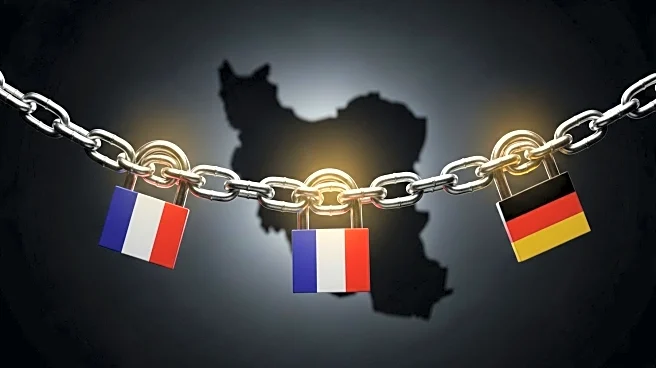What's Happening?
The United Kingdom, France, and Germany have reinstated United Nations sanctions on Iran, citing the country's continued nuclear escalation and lack of cooperation with the International Atomic Energy Agency (IAEA). This decision comes ten years after the original sanctions were lifted as part of the Joint Comprehensive Plan of Action (JCPOA), a landmark nuclear deal. The European countries, known collectively as the E3, activated the 'snapback' mechanism, which allows for the reimposition of sanctions if Iran is found to be in breach of the agreement. The E3's decision follows Iran's refusal to allow IAEA inspectors access to its nuclear sites and its failure to account for its stockpile of high-enriched uranium. Iran's President Masoud Pezeshkian has condemned the sanctions as unfair and illegal, asserting that Iran has no intention of developing nuclear weapons.
Why It's Important?
The reimposition of sanctions on Iran by the E3 is significant as it underscores the ongoing tensions surrounding Iran's nuclear program and the challenges of international diplomacy. The sanctions could have substantial economic impacts on Iran, potentially exacerbating existing economic difficulties. For the international community, this move highlights the complexities of enforcing nuclear non-proliferation agreements and the geopolitical tensions that arise from such enforcement. The decision also reflects the E3's commitment to preventing nuclear escalation, despite the potential for increased regional instability. The sanctions may affect global oil markets and international relations, particularly with countries that have economic ties to Iran.
What's Next?
The E3 has expressed a willingness to continue diplomatic negotiations with Iran, despite the reimposition of sanctions. However, Iran's response, including the recall of its ambassadors to the UK, France, and Germany, suggests a potential escalation in diplomatic tensions. The situation may lead to further negotiations or retaliatory measures by Iran, which could impact regional security and international diplomatic efforts. The international community will be closely monitoring Iran's next steps, particularly regarding its nuclear activities and cooperation with the IAEA.
Beyond the Headlines
The reimposition of sanctions raises broader questions about the effectiveness of international agreements like the JCPOA and the role of major powers in enforcing compliance. It also highlights the delicate balance between diplomatic engagement and coercive measures in addressing nuclear proliferation. The situation may influence future negotiations on nuclear non-proliferation and the strategies employed by countries to ensure compliance with international norms.










